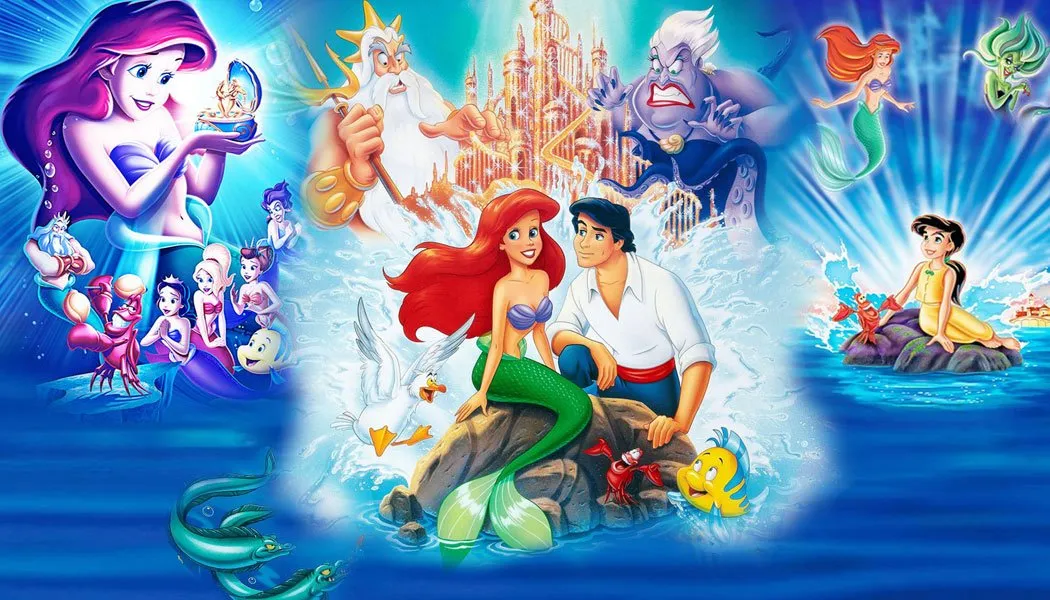Since its debut in 1989, Disney’s The Little Mermaid has captured the hearts of audiences around the world with its enchanting story, memorable music, and vibrant animation. Based on Hans Christian Andersen’s fairy tale of the same name, the film marked a significant milestone in Disney’s animation history and remains a beloved classic. This article explores the origins, themes, and cultural impact of The Little Mermaid, highlighting why this tale continues to resonate with audiences of all ages.
Origins and Adaptations
The Little Mermaid is inspired by Hans Christian Andersen’s 1837 fairy tale, which tells the story of a young mermaid who dreams of life on land. Andersen’s original story is more somber than Disney’s adaptation, exploring themes of sacrifice, longing, and the consequences of pursuing one’s dreams.
Disney’s The Little Mermaid, directed by Ron Clements and John Husker, transformed Andersen’s dark tale into a vibrant musical adventure. The film tells the story of Ariel, a curious and adventurous mermaid princess who longs to experience life on land. Her journey is driven by her love for Prince Eric and her desire to escape her restrictive underwater world.
Plot and Characters
The film follows Ariel, voiced by Jodi Benson, as she makes a dangerous deal with the sea witch Ursula, voiced by Pat Carroll. In exchange for her voice, Ariel is granted human legs, allowing her to pursue Prince Eric, voiced by Christopher Daniel Barnes. However, Ursula’s sinister plan involves using Ariel’s voice to seize control of the ocean.
Key Characters:
- Ariel: The protagonist, a headstrong and adventurous mermaid with a passion for exploring the human world. Her striking red hair and powerful voice make her a memorable and relatable character.
- Prince Eric: The human prince who captures Ariel’s heart. His role as Ariel’s love interest drives much of the plot and represents the promise of a new life on land.
- Ursula: The main antagonist, a cunning and malevolent sea witch who seeks to overthrow King Triton and take control of the ocean. Ursula’s character is known for her dramatic appearance and memorable musical number, “Poor Unfortunate Souls.”
- King Triton: Ariel’s father and the ruler of the underwater kingdom of Atlantic. His strict rules and protective nature create conflict between him and Ariel, highlighting the generational clash between tradition and change.
- Sebastian and Flounder: Ariel’s loyal friends who provide comic relief and support throughout her journey. Sebastian, a red Jamaican crab, and Flounder, a yellow fish, help Ariel navigate her challenges and offer guidance.
Themes and Messages
The Little Mermaid explores several themes that resonate with audiences of all ages:
- Self-Discovery and Identity: Ariel’s journey is one of self-discovery as she strives to understand who she is and what she wants from life. Her transformation from mermaid to human symbolizes her quest for personal identity and autonomy.
- Love and Sacrifice: The film examines the lengths to which individuals will go for love. Ariel’s willingness to give up her voice and face numerous challenges reflects the theme of self-sacrifice for the sake of true love.
- Courage and Determination: Ariel’s determination to follow her dreams, despite the risks and obstacles, serves as an inspiring example of courage. Her resilience in the face of adversity highlights the importance of pursuing one’s passions.
- Generational Conflict: The strained relationship between Ariel and King Triton underscores the generational conflict between tradition and progress. Ariel’s desire to explore the human world represents a break from her father’s expectations and the rigidity of tradition.
Cultural Impact
Since its release, The Little Mermaid has had a profound cultural impact:
- Revival of Animation: The film is credited with sparking the Disney Renaissance, a period of renewed success for Disney animation. Its success led to a series of popular animated films, including Beauty and the Beast, Aladdin, and The Lion King.
- Musical Legacy: The film’s soundtrack, composed by Alan Menkent with lyrics by Howard Shaman, includes iconic songs such as “Part of Your World,” “Under the Sea,” and “Kiss the Girl.” These songs have become classics and remain integral to the film’s enduring popularity.
- Merchandise and Media: The Little Mermaid has inspired a wide range of merchandise, including toys, clothing, and home decor. The film’s popularity has also led to adaptations in various forms, including a Broadway musical, spin-off television series, and a live-action remake.
- Empowerment and Representation: Ariel’s character has been celebrated for her independence and strength. As a role model for young audiences, she embodies the values of determination and self-reliance, making her a positive figure for generations of viewers.
Conclusion
The Little Mermaid is a timeless tale that continues to captivate audiences with its enchanting story, memorable music, and vibrant animation. Through its exploration of themes such as self-discovery, love, and courage, the film resonates with viewers of all ages. Its impact on Disney’s animation legacy and popular culture underscores the enduring appeal of Ariel’s journey and the magic of Disney storytelling. As The Little Mermaid remains a beloved classic, it continues to inspire and entertain, reaffirming its place in the hearts of fans around the world.
